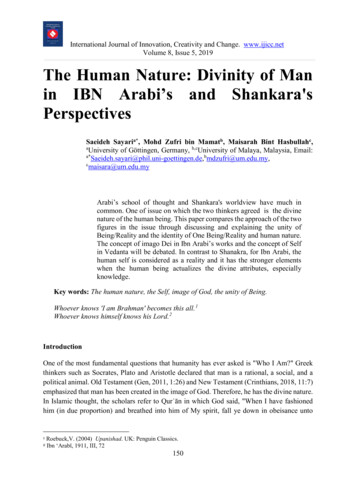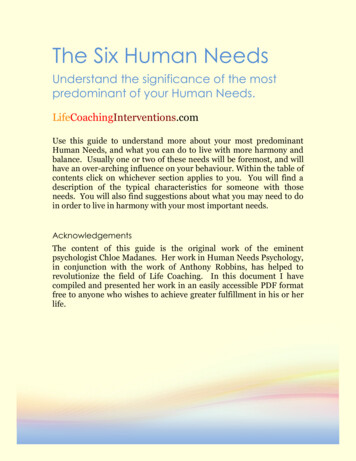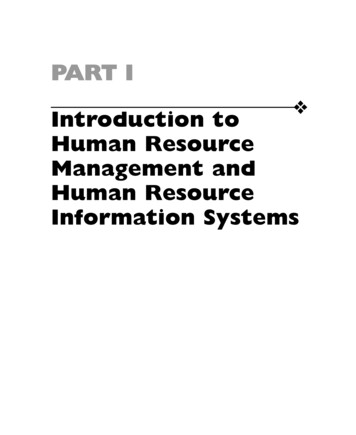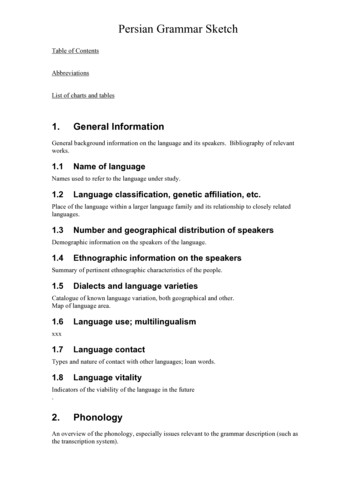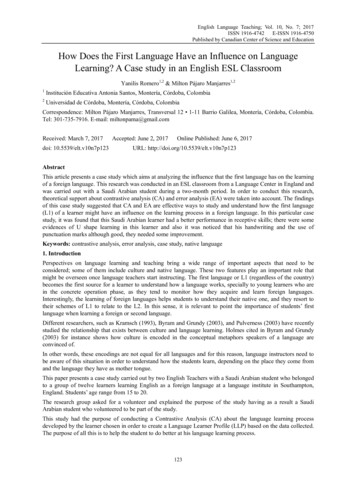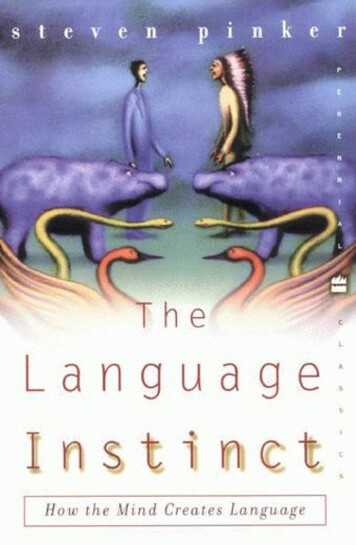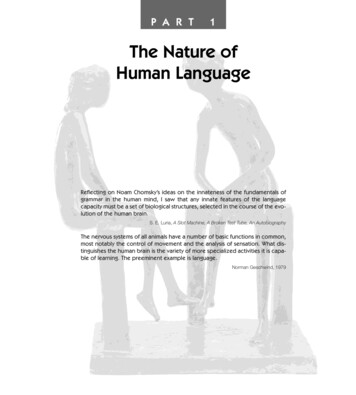
Transcription
P A R T1The Nature ofHuman LanguageReflecting on Noam Chomsky’s ideas on the innateness of the fundamentals ofgrammar in the human mind, I saw that any innate features of the languagecapacity must be a set of biological structures, selected in the course of the evolution of the human brain.S. E. Luria, A Slot Machine, A Broken Test Tube, An AutobiographyThe nervous systems of all animals have a number of basic functions in common,most notably the control of movement and the analysis of sensation. What distinguishes the human brain is the variety of more specialized activities it is capable of learning. The preeminent example is language.Norman Geschwind, 1979
Chapter 1What Is Language?When we study human language, we are approaching what some might call the“human essence,” the distinctive qualities of mind that are, so far as we know,unique to man.Noam Chomsky, Language and MindBy permission of Johnny Hart and Creators Syndicate, Inc.Whatever else people do when they come together—whether they play, fight, makelove, or make automobiles—they talk. We live in a world of language. We talk to ourfriends, our associates, our wives and husbands, our lovers, our teachers, our parentsand in-laws. We talk to bus drivers and total strangers. We talk face-to-face and over thetelephone, and everyone responds with more talk. Television and radio further swell thistorrent of words. Hardly a moment of our waking lives is free from words, and even inour dreams we talk and are talked to. We also talk when there is no one to answer. Someof us talk aloud in our sleep. We talk to our pets and sometimes to ourselves.The possession of language, perhaps more than any other attribute, distinguisheshumans from other animals. To understand our humanity one must understand thenature of language that makes us human. According to the philosophy expressed in themyths and religions of many peoples, it is language that is the source of human life andpower. To some people of Africa, a newborn child is a kuntu, a “thing,” not yet a muntu,a “person.” Only by the act of learning does the child become a human being. Thus,according to this tradition, we all become “human” because we all know at least one language. But what does it mean to “know” a language?3
4Chapter 1What Is Language?LINGUISTIC KNOWLEDGEWhen you know a language, you can speak and be understood by others who know thatlanguage. This means you have the capacity to produce sounds that signify certain meanings and to understand or interpret the sounds produced by others. We are referring tonormal-hearing individuals. Deaf persons produce and understand sign languages just ashearing persons produce and understand spoken languages. The languages of the deafcommunities throughout the world are, except for their modality of expression, equivalent to spoken languages.Everyone knows a language. Five-year-old children are almost as proficient atspeaking and understanding as are their parents. Yet the ability to carry out the simplestconversation requires profound knowledge that most speakers are unaware of. This isas true of speakers of Japanese as of English, of Armenian as of Navajo. A speaker ofEnglish can produce a sentence having two relative clauses without knowing what a relative clause is, likeMy goddaughter who was born in Sweden and who now lives in Iowa isnamed Disa, after a Viking queen.In a parallel fashion, a child can walk without understanding or being able to explainthe principles of balance and support, or the neurophysiological control mechanismsthat permit one to do so. The fact that we may know something unconsciously is notunique to language.What, then, do speakers of English or Quechua or French or Mohawk or Arabic know?Knowledge of the Sound SystemBy permission of Johnny Hart and Creators Syndicate, Inc.Knowing a language means knowing what sounds (or signs1) are in that language andwhat sounds are not. This unconscious knowledge is revealed by the way speakers of1 The sign languages of the deaf will be discussed throughout the book. As stated, they are essentially the sameas spoken languages, except that they use gestures instead of sounds. A reference to ‘language’ then, unlessspeech sounds or spoken languages are specifically mentioned, includes both spoken and signed languages.
Linguistic Knowledge5one language pronounce words from another language. If you speak only English, forexample, you may substitute an English sound for a non-English sound when pronouncing “foreign” words. Most English speakers pronounce the name Bach with afinal k sound because the sound represented by the letters ch in German is not anEnglish sound. If you pronounce it as the Germans do, you are using a sound outsidethe English sound system. French people speaking English often pronounce words likethis and that as if they were spelled zis and zat. The English sound represented by theinitial letters th is not part of the French sound system, and the French mispronunciation reveals the speakers’ unconscious knowledge of this fact.Knowing the sound system of a language includes more than knowing the inventoryof sounds. It includes knowing which sounds may start a word, end a word, and followeach other. The name of a former president of Ghana was Nkrumah, pronounced with aninitial sound identical to the sound ending the English word sing (for most Americans).While this is an English sound, no word in English begins with the ng sound. Mostspeakers of English mispronounce this name (by Ghanaian standards) by inserting ashort vowel before or after the ng sound. Children who learn English recognize this factabout our language, just as Ghanaian children learn that words in their language maybegin with the ng sound.We will learn more about sound systems in Chapters 6 and 7.Knowledge of WordsKnowing the sounds and sound patterns in our language constitutes only one part of ourlinguistic knowledge. In addition, knowing a language is knowing that certain soundsequences signify certain concepts or meanings. Speakers of English know what boymeans and that it means something different from toy or girl or pterodactyl. When youknow a language you know words in that language, that is, the sound units that arerelated to specific meanings.Arbitrary Relation of Form and MeaningThe minute I set eyes on an animal I know what it is. I don’t have to reflecta moment; the right name comes out instantly. I seem to know just by theshape of the creature and the way it acts what animal it is. When the dodocame along he [Adam] thought it was a wildcat. But I saved him. I just spokeup in a quite natural way and said “Well, I do declare if there isn’t the dodo!”Mark Twain, Eve’s DiaryIf you do not know a language, the words (and sentences) will be mainly incomprehensible, because the relationship between speech sounds and the meanings they representin the languages of the world is, for the most part, an arbitrary one. You have to learn(when you are acquiring the language) that the sounds represented by the letters house(in the written form of the language) signify the concept; if you know French,this same meaning is represented by maison; if you know Twi, it is represented byOdaN; if you know Russian, by dom; if you know Spanish, by casa. Similarly, the
6Chapter 1What Is Language?is represented by hand in English, main in French, nsa in Twi, and ruka inRussian.The following are words in some different languages. How many of them can atoowqbolnawartawaninaminatuyawwaSpeakers of the languages from which these words are taken know that they have thefollowing meanings:a.b.c.d.e.f.g.h.i.a large parasol (in a Ghanaian language, Twi)living creature (in a Native American language, Papago)wood (in Turkish)morning (in Japanese)is seeing (in a California Indian language, Luiseño)to speak (in a Pakistani language, Urdu); to ache (in Russian)reporter (in Indonesian)teacher (in a Venezuelan Indian language, Warao)right on! (in a Nigerian language, Hausa)These examples show that the sounds of words are only given meaning by the language in which they occur, despite what Eve says in Mark Twain’s satire Eve’s Diary.A pterodactyl could have been called ron, blick, or kerplunkity.
Linguistic Knowledge7HERMAN Copyright 1991 Jim Unger. Reprinted with permission of Laughing Stock Licensing, Inc. Allrights reserved.As Shakespeare has Juliet say:What’s in a name? That which we call a roseBy any other name would smell as sweet.This arbitrary relationship between the form (sounds) and meaning (concept) of aword in spoken language is also true of the sign languages used by the deaf. If you seesomeone using a sign language you do not know, it is doubtful that you will understandthe message from the signs alone. A person who knows Chinese Sign Language wouldfind it difficult to understand American Sign, and vice versa.Signs that may have originally been mimetic (similar to miming) or iconic (with anonarbitrary relationship between form and meaning) change historically as do words,and the iconicity is lost. These signs become conventional, so knowing the shape ormovement of the hands does not reveal the meaning of the gestures in sign languages.
8Chapter 1What Is Language?FIGURE 1-1 Arbitrary relation between gestures and meanings of the signs forfather and suspect in ASL and CSL.2FATHER (ASL)FATHER (CSL)SUSPECT (ASL)SUSPECT (CSL)Copyright 1987 by Massachusetts Institute of Technology.There is some sound symbolism in language—that is, words whose pronunciationsuggests the meaning. A few words in most languages are onomatopoeic—the soundsof the words supposedly imitate the sounds of nature. Even here, the sounds differ fromone language to another, reflecting the particular sound system of the language. In English we say cockadoodledoo to represent the rooster’s crow, but in Russian they saykukuriku.Sometimes particular sound sequences seem to relate to a particular concept. In English many words beginning with gl relate to sight, such as glare, glint, gleam, glitter,glossy, glaze, glance, glimmer, glimpse, and glisten. However, such words are a verysmall part of any language, and gl may have nothing to do with “sight” in another language, or even in other words in English, such as gladiator, glucose, glory, glycerine,globe, and so on.English speakers know the gl words that relate to sight and those that do not; theyknow the onomatopoeic words and all the words in the basic vocabulary of the language. There are no speakers of English who know all 450,000 words listed in Webster’s Third New International Dictionary; but even if there were and that were all they2 From What the Hands Reveal about the Brain by Howard Poizner, Edward S. Klima, Ursula Bellugi. 1987.Cambridge, MA: MIT Press.
Linguistic Knowledge9knew, they would not know English. Imagine trying to learn a foreign language by buying a dictionary and memorizing words. No matter how many words you learned, youwould not be able to form the simplest phrases or sentences in the language or understand a native speaker. No one speaks in isolated words. (Of course, you could searchin your traveler’s dictionary for individual words to find out how to say something like“car—gas—where?” After many tries, a native might understand this question and thenpoint in the direction of a gas station. If you were answered with a sentence, however,you probably would not understand what was said or be able to look it up, because youwould not know where one word ended and another began.) Chapter 5 will furtherexplore word meanings.The Creativity of Linguistic KnowledgeBy permission of Johnny Hart and Creators Syndicate, Inc.Knowledge of a language enables you to combine words to form phrases, and phrasesto form sentences. You cannot buy a dictionary of any language with all its sentences,because no dictionary can list all the possible sentences. Knowing a language meansbeing able to produce new sentences never spoken before and to understand sentencesnever heard before. The linguist Noam Chomsky refers to this ability as part of the creative aspect of language use. Not every speaker of a language can create great literature, but you, and all persons who know a language, can and do create new sentenceswhen you speak and understand new sentences created by others.This creative ability is due to the fact that language use is not limited to stimulusresponse behavior. It’s true that if someone steps on our toes we will automaticallyrespond with a scream or gasp or grunt, but these sounds are really not part of language;they are involuntary reactions to stimuli. After we automatically cry out, we can say“That was some clumsy act, you big oaf ” or “Thank you very much for stepping on mytoe because I was afraid I had elephantiasis and now that I can feel it hurt I know it isn’tso,” or any one of an infinite number of sentences, because the particular sentence weproduce is not controlled by any stimulus.Even some involuntary cries like ouch are constrained by our own language system,as are the filled pauses that are sprinkled through conversational speech—er or uh oryou know in English. They contain only the sounds found in the language. Frenchspeakers, for example, often fill their pauses with the vowel sound that starts with theirword for egg—oeuf—a sound that does not occur in English. Knowing a languageincludes knowing what sentences are appropriate in various situations. Saying “Hamburger costs 2.00 a pound” after someone has just stepped on your toe would hardlybe an appropriate response, although it would be possible.
10Chapter 1What Is Language?Consider the following sentence: “Daniel Boone decided to become a pioneerbecause he dreamed of pigeon-toed giraffes and cross-eyed elephants dancing in pinkskirts and green berets on the wind-swept plains of the Midwest.” You may not believethe sentence; you may question its logic; but you can understand it, although you probably never heard or read it before now.Knowledge of a language, then, makes it possible to understand and produce newsentences. If you counted the number of sentences in this book that you have seen orheard before, the number would be small. Next time you write an essay or a letter, seehow many of your sentences are new. Few sentences are stored in your brain, to bepulled out to fit some situation or matched with some sentence that you hear. Novel sentences never spoken or heard before cannot be stored in your memory.Simple memorization of all the possible sentences in a language is impossible inprinciple. If for every sentence in the language a longer sentence can be formed, thenthere is no limit to the length of any sentence and therefore no limit to the number ofsentences. In English you can say:This is the house.orThis is the house that Jack built.orThis is the malt that lay in the house that Jack built.orThis is the dog that chased the cat that killed the rat that ate the malt that layin the house that Jack built.And you need not stop there. How long, then, is the longest sentence? A speaker ofEnglish can say:The old man came.orThe old, old, old, old, old man came.How many “olds” are too many? Seven? Twenty-three?It is true that the longer these sentences become, the less likely we would be to hearor to say them. A sentence with 276 occurrences of “old” would be highly unlikely ineither speech or writing, even to describe Methuselah; but such a sentence is theoretically possible. If you know English, you have the knowledge to add any number ofadjectives as modifiers to a noun.All human languages permit their speakers to form indefinitely long sentences; “creativity” is a universal property of human language.To memorize and store an infinite set of sentences would require an infinite storagecapacity. However, the brain is finite, and even if it were not, we could not store novelsentences.
Linguistic Knowledge11Knowledge of Sentences and NonsentencesWhen you learn a language you must learn something finite—your vocabulary is finite(however large it may be)—and that can be stored. If sentences in a language wereformed by putting one word after another in any order, then language could simply bea set of words. You can see that words are not enough by examining the followingstrings of words:(1) a.b.c.d.e.f.g.h.John kissed the little old lady who owned the shaggy dog.Who owned the shaggy dog John kissed the little old lady.John is difficult to love.It is difficult to love John.John is anxious to go.It is anxious to go John.John, who was a student, flunked his exams.Exams his flunked student a was who John.If you were asked to put a star or asterisk before the examples that seemed “funny”or “no good” to you, which ones would you star? Our “intuitive” knowledge about whatis or is not an allowable sentence in English convinces us to star b, f, and h. Which onesdid you star?Would you agree with the following judgments?(2) a.b.c.d.e.f.g.h.What he did was climb a tree.*What he thought was want a sports car.3Drink your beer and go home!*What are drinking and go home?I expect them to arrive a week from next Thursday.*I expect a week from next Thursday to arrive them.Linus lost his security blanket.*Lost Linus security blanket his.If you find the starred sentences unacceptable as we do, you see that every string ofwords does not constitute a well-formed sentence in a language. Knowledge of a language determines which strings of words are and which are not sentences. Therefore, inaddition to knowing the words of the language, linguistic knowledge includes rules forforming sentences and making the kinds of judgments you made about the examples in(1) and (2). These rules must be finite in length and finite in number so that they can bestored in our finite brains; yet they must permit us to form and understand an infinite setof new sentences, as we discussed earlier. They are not rules determined by a judge ora legislature or even rules taught in a grammar class. They are unconscious constraintson sentence formation that children discover about the language.A language, then, consists of all the sounds, words, and possible sentences. Whenyou know a language, you know the sounds, the words, and the rules for their combination.3 The asterisk is used before examples that speakers, for any reason, find unacceptable. This notation will beused throughout the book.
12Chapter 1What Is Language?LINGUISTIC KNOWLEDGEAND PERFORMANCE“What’s one and one and one and one and one and one and one and one andone and one?” “I don’t know,” said Alice. “I lost count.” “She can’t doAddition,” the Red Queen interrupted.Lewis Carroll, Through the Looking-GlassThe Born Loser reprinted by permission of NEA, Inc.Speakers’ linguistic knowledge permits them to form longer and longer sentences byjoining sentences and phrases together or adding modifiers to a noun. Whether you stopat three, five, or eighteen adjectives, it is impossible to limit the number you could addif desired. Very long sentences are theoretically possible, but they are highly improbable. Evidently there is a difference between having the knowledge necessary to producesentences of a language and applying this knowledge. It is a difference between whatyou know, which is your linguistic competence, and how you use this knowledge inactual speech production and comprehension, which is your linguistic performance.Speakers of all languages—spoken and signed—have the knowledge to understandor produce sentences of any length. When they attempt to use that knowledge, though—when they perform linguistically—there are physiological and psychological reasonsthat limit the number of adjectives, adverbs, clauses, and so on. They may run out of
Linguistic Knowledge and Performance13breath, their audience may leave, they may lose track of what they have said, and ofcourse, no one lives forever.When we speak we usually wish to convey some message. (Although it seems thatsome of us occasionally like to talk just to hear our own voices.) At some stage in theact of producing speech we must organize our thoughts into strings of words. Sometimes the message gets garbled. We may stammer, or pause, or produce slips of thetongue. We may even sound like Tarzan in the cartoon by Gary Larson, who illustratesthe difference between linguistic knowledge and the way we use that knowledge in performance.THE FAR SIDE copyright 1991, 1987, and 1986, Universal Press Syndicate.Reprinted with permission. All rights reserved.For the most part, linguistic knowledge is not conscious knowledge. The linguisticsystem—the sounds, structures, meanings, words, and rules for putting them alltogether—is learned subconsciously with no awareness that rules are being learned.Just as we may be unconscious of the rules that allow us to stand or walk, to crawl onall fours if we choose, to jump or catch a baseball, or to ride a bicycle, our unconsciousability to speak and understand and to make judgments about sentences reveals ourknowledge of the rules of our language. This knowledge represents a complex cognitive system. The nature of this system is what this book is all about.
14Chapter 1What Is Language?WHAT IS GRAMMAR?We use the term “grammar” with a systematic ambiguity. On the one hand,the term refers to the explicit theory constructed by the linguist and proposed as a description of the speaker’s competence. On the other hand, itrefers to this competence itself.N. Chomsky and M. Halle, The Sound Pattern of EnglishDescriptive GrammarsThe sounds and sound patterns, the basic units of meaning, such as words, and the rulesto combine them to form new sentences constitute the grammar of a language. Thegrammar, then, is what we know; it represents our linguistic competence. To understandthe nature of language we must understand the nature of this internalized, unconsciousset of rules, which is part of every grammar of every language.Every human being who speaks a language knows its grammar. When linguists wishto describe a language, they attempt to describe the grammar of the language that existsin the minds of its speakers. There may be some differences among speakers’ knowledge, but there must be shared knowledge, because it is this grammar that makes it possible to communicate through language. To the extent that the linguist’s description is atrue model of the speakers’ linguistic capacity, it will be a successful description of thegrammar and of the language itself. Such a model is called a descriptive grammar. Itdoes not tell you how you should speak; it describes your basic linguistic knowledge. Itexplains how it is possible for you to speak and understand, and it tells what you knowabout the sounds, words, phrases, and sentences of your language.We have used the word grammar in two ways: the first in reference to the mentalgrammar speakers have in their brains; the second as the model or description of thisinternalized grammar. Almost two thousand years ago the Greek grammarian Dionysius Thrax defined grammar as that which permits us either to speak a language or tospeak about a language. From now on we will not differentiate these two meanings,because the linguist’s descriptive grammar is an attempt at a formal statement (or theory) of the speakers’ grammar.When we say in later chapters that there is a rule in the grammar—such as “Everysentence has a noun phrase subject and a verb phrase predicate”—we posit the rule inboth the mental grammar and the descriptive model of it, the linguist’s grammar. Whenwe say that a sentence is grammatical, we mean that it conforms to the rules of bothgrammars; conversely, an ungrammatical (starred, unacceptable) sentence deviates insome way from these rules. If, however, we posit a rule for English that does not agreewith your intuitions as a speaker, then the grammar we are describing differs in someway from the mental grammar that represents your linguistic competence; that is, yourlanguage is not the one described. No language or variety of a language (called adialect) is superior to any other in a linguistic sense. Every grammar is equally complexand logical and capable of producing an infinite set of sentences to express any thought.If something can be expressed in one language or one dialect, it can be expressed in anyother language or dialect. It might involve different means and different words, but itcan be expressed.
What Is Grammar?15No grammar, therefore no language, is either superior or inferior to any other. Languages of technologically undeveloped cultures are not primitive or ill formed in any way.Prescriptive GrammarsIt is a rule up with which we should not put.Winston ChurchillI don’t want to talk grammar. I want to talk like a lady.G. B. Shaw, Pygmalion by Chronicle Features.The views expressed in the section above are not those of all grammarians now or in thepast. From ancient times until the present, “purists” have believed that language changeis corruption and that there are certain “correct” forms that all educated people shoulduse in speaking and writing. The Greek Alexandrians in the first century, the Arabicscholars at Basra in the eighth century, and numerous English grammarians of the eighteenth and nineteenth centuries held this view. They wished to prescribe rather thandescribe the rules of grammar, which gave rise to the writing of prescriptive grammars.
16Chapter 1What Is Language?With the rise of capitalism, a new middle class emerged who wanted their childrento speak the dialect of the “upper” classes. This desire led to the publication of manyprescriptive grammars. In 1762 an influential grammar, A Short Introduction to EnglishGrammar with Critical Notes, was written by Bishop Robert Lowth. Lowth, influencedby Latin grammar and by personal preference, prescribed a number of new rules forEnglish. Before the publication of his grammar, practically everyone—upper-class,middle-class, and lower-class speakers of English—said I don’t have none, You waswrong about that, and Mathilda is fatter than me. Lowth, however, decided that “twonegatives make a positive” and therefore one should say I don’t have any; that evenwhen you is singular it should be followed by the plural were; and that I not me, he nothim, they not them, and so forth should follow than in comparative constructions. Manyof these prescriptive rules were based on Latin grammar, which had already given wayto different rules in the languages that developed from Latin. Because Lowth was influential and because the rising new class wanted to speak “properly,” many of these newrules were legislated into English grammar, at least for the prestige dialect.The view that dialects that regularly use double negatives are inferior cannot be justified if one looks at the standard dialects of other languages in the world. Romance languages, for example, utilize double negatives, as the following examples from Frenchand Italian show:French: Je ne veux parler avec personne.I not want speak with no-one.Italian: Non voglio parlare con nessuno.not I-want speak with no-one.English translation: “I don’t want to speak with anyone.”Grammars such as Lowth’s are different from the descriptive grammars we havebeen discussing. Their goal is not to describe the rules people know, but to tell themwhat rules they should know.In 1908, a grammarian, Thomas R. Lounsbury, wrote: “There seems to have been inevery period in the past, as there is now, a distinct apprehension in the minds of verymany worthy persons that the English tongue is always in the condition approaching collapse and that arduous efforts must be put forth persistently to save it from destruction.”Today our bookstores are filled with books by language “purists” attempting to dojust that. Edwin Newman, for example, in his books Strictly Speaking and A CivilTongue, rails against those who use the word hopefully to mean “I hope,” as in “Hopefully, it will not rain tomorrow,” instead of using it “properly” to mean “with hope.”What Newman fails to recognize is that language changes in the course of time andwords change meaning, and the meaning of hopefully has been broadened for mostEnglish speakers to include both usages. Other “saviors” of the English language blametelevision, the schools, and even the National Council of Teachers of English for failingto preserve the standard language, and they mount attacks against those college anduniversity professors who suggest that African American English (AAE)4 and other4 AAE is also called African American Vernacular English (AAVE), Ebonics, and Black English (BE). This isa dialect spoken by some but by no means all African Americans.
What Is Grammar?17dialects are viable, living, complete languages. Although not mentioned by name, theauthors of this textbook would clearly be among those who would be criticized by thesenew prescriptivists.There is even a literary organization dedicated to the proper use of the English language, called the Unicorn Society of Lake Superior State College, which issues anannual “dishonor list” of words and phrases of which they do not approve, including theword “medication,” which they say “We can no longer afford. It’s too expensive. We’vegot to get back to the cheaper ‘medicine.’ ” 5 At least these guardians of the English language have a sense of humor; but they as well as the other prescriptivists are bound tofail. Language is vigorous and dynamic and constantly changing. All languages anddialects are expressive, complete, and logical, as much so as they were 200 or 2000years ago. If sentences are muddled, it is not because of the language but because of thespeakers. Prescriptivists should be more concerned about the thinking of the speakersthan about the language they use. Hopefully this book will convince you of this.Linguists object to prescriptivism for a number of reasons. The views are elitist, inthat they assume that
word in spoken language is also true of the sign languages used by the deaf. If you see someone using a sign language you do not know , it is doubtful that you will understand the message from the signs alone. A person who knows Chinese Sign Language would find it difficult to u

